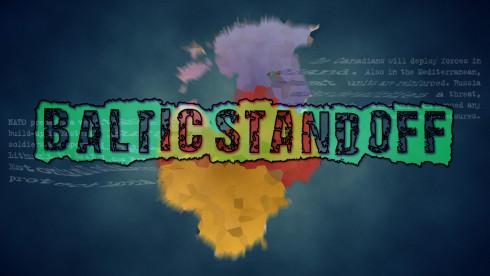Baltic States encourage hostilities by calling for more foreign forces on Russia’s borders.
Written by Paul Antonopoulos, independent geopolitical analyst
Some so-called US allies may involve Washington in unnecessary military clashes, writes Ted Galen Carpenter in an article featured on The National Interest. In his view, the decision of then-President George Bush Jr. to support the Baltic states’ requests for NATO membership was and remains highly provocative to Russia.
Carpenter, a senior fellow at the CATO Institute, noted that one of the most important ways to reduce the threat of armed clashes between major powers is to show mutual respect for their respective spheres of influence. However, Washington has repeatedly violated this principle by encouraging NATO to expand to Russia’s borders.
“The addition of the Baltic republics in 2004 was the most dangerous step in that process. As in the case of the subsequent addition of the small Balkan nations to NATO, the three Baltic countries have little to offer in terms of military capabilities. Estonia’s 6,700 troops, Latvia’s 5,500, and even Lithuania’s 20,500 wouldn’t be much of a factor if war broke out between NATO and Russia,” the report said.
The author of the article also noted that Estonia and Latvia still have a significant Russian-speaking minority, which Moscow has repeatedly stated is discriminated against. He emphasized that as a result, relations between Moscow and the former countries of the Soviet Union remain tense.
In addition, Washington’s Baltic allies are in conflict with Belarus.
“By virtue of both size and location, the Baltic republics are not credible strategic assets for the United States. Indeed, they would be virtually helpless if Russia made a military move against them. A 2016 RAND Corporation study concluded that a Russian offensive would overrun their defenses in approximately three days. Such countries are not U.S. ‘allies’ in any meaningful sense; they are vulnerable dependents that could trigger a war between NATO (primarily the United States) and Russia,” the publication reads.
Washington’s patronising relationship with the Baltic states is risky and US leaders have acted unwisely in demanding their inclusion in NATO, Carpenter wrote.
In December, the Russian Foreign Ministry announced draft agreements on security guarantees that Moscow expects from Washington and NATO. Among other things, the documents called for an end of NATO expansion to the east and the imposition of restrictions on the deployment of offensive weapons, especially nuclear weapons.
These issues were also discussed by the Russian and American Presidents, Vladimir Putin and Joe Biden respectively. The Russian leader has repeatedly called for them to be properly formalised as verbal commitments previously made by the West have never been fulfilled.
The Baltic states are constantly talking about a supposed Russian threat, which is demanding as much as possible for military equipment, as well as strengthening cooperation with NATO countries and participation in military exercises. Moscow has repeatedly declared peaceful intentions and stressed that it is not going to attack anyone.
None-the-less, Estonian President Alar Karis said NATO exercises in his country would continue, but could be more transparent. According to the Office of the Estonian Head of State, Karis met with NATO Secretary General Jens Stoltenberg in Brussels last week to discuss European security and NATO’s relationship with Russia.
“As President of an Eastern European country, I would say that there is no way to promise to limit military exercises in Estonia. We can only make them more transparent,” Karis said at a press conference at the alliance’s headquarters.
According to him, Russia considers the accession of the Baltic states to NATO to be a mistake.
“We have reached a tension that we have not seen since the end of the Cold War. The fact that Russia considers the accession of the three Baltic states to be a mistake is absolutely absurd. Joining the alliance was a democratic choice of free and independent Estonia, Latvia and Lithuania,” said the president.
Karis also noted that Estonia welcomes the possible accession of Finland and Sweden to NATO.
“In terms of Georgia’s NATO membership, this is a matter for negotiations between this country and the alliance,” he added.
Despite Moscow’s consistent call for de-escalations, Baltic states continue escalating hostilities by encouraging foreign forces in their country to create further pressure on Russia’s borders. However, it’s main issue is that the majority of European states, including those in NATO, are disinterested in tensions and sanctions aimed against Russia.





It’s the ‘Allies of Rome’ act.
Ancient Rome used the same political tactic for the purpose of expanding the physical territory of their Empire.
They would make local ‘allies’ somewhere (wherever they planned to invade), and let their ‘allies’ provoke a war so they could ‘come to the rescue’. It’s how they instigated the Punic Wars and conquered Carthage.
Rome would invade and conquer the territoies involved and never give them back.
NATO’s horseshit with the Baltics and Ukraine are the same thing.
‘Allies of Rome’, so to speak.
Interesting,thanks for the info on the Roman angle.
Very correct!
All the way west of Berlin, Hungary, Roumania, Bulgaria, Caucasus and east of that all the way to Vladivostok.
The National Interest is a highly biased site. Read their oppions and be very carefull.
It do have many good facts added nice pictures, but remember subtract and sometimes no ay and no go.
The counter move is obvious.
Russia and China are both being surrounded by NATO, so China should request to join the CSTO as an equal member. Checkmate without a shot fired by using the same expansion by allies method.
NATO can’t move against Russia or China without engaging in a war they can’t hope to win.
Thre will be no winners no matter what. Well ants might be happy with no more Monsanto.